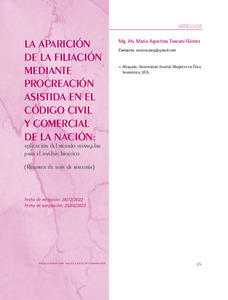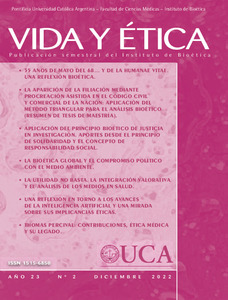Please use this identifier to cite or link to this item:
https://repositorio.uca.edu.ar/handle/123456789/16455| Título: | La aparición de la filiación mediante procreación asistida en el Código Civil y Comercial de la Nación: aplicación del método triangular para el análisis bioético | Autor: | Toscani Gómez, María Agustina | Palabras clave: | DERECHOS DEL NIÑO; PERSONALISMO ONTOLÓGICO; PROCREACION ARTIFICIAL; DERECHO DE FAMILIA; REPRODUCCION HUMANA ASISTIDA; FILIACION | Fecha de publicación: | 2022 | Editorial: | Educa | Cita: | Toscani Gómez, M. A. La aparición de la filiación mediante procreación asistida en el Código Civil y Comercial de la Nación: aplicación del método triangular para el análisis bioético [en línea]. Vida y Etica. 2022, 23 (1). Disponible en: https://repositorio.uca.edu.ar/handle/123456789/16455 | Resumen: | Resumen:
En este trabajo se realiza un juicio bioético sobre la filiación por procreación
artificial establecida en el Código Civil
y Comercial de la Nación, aplicando
el método triangular propuesto por
Sgreccia para análisis bioético. El mismo
comienza examinando el dato fáctico,
en este caso, la norma jurídica, y luego se observan los valores antropológicos comprometidos. Así, se concluye
que la filiación mediante técnicas de
reproducción asistida parte de una
errada concepción del ser humano,
vulnera valores como la verdad, la vida
y la dignidad, y no respeta ninguno
de los cuatro principios jerarquizados
del Personalismo ontológico, debiendo considerarse bioéticamente ilícita.
También se comprueba que compromete derechos humanos fundamentales, afectando la coherencia del sistema
jurídico argentino y del mismo Código.
Se concluye con una serie de propuestas para promover la cultura de la vida
y de los derechos humanos en la que
no se descarte a ningún miembro de la
familia humana. Abstract: In this paper a bioethical judgment is made on filiation by artificial procreation established in the Civil and Commercial Code of the Nation, applying the triangular method proposed by SGRECCIA for bioethical analysis. It begins by examining the factual data, in this case, the legal norm, and then the anthropological values involved are observed. Thus, it is concluded that filiation by means of assisted reproduction techniques is based on an erroneous conception of the human being, violates values such as truth, life and dignity, and does not respect any of the four hierarchical principles of ontological Personalism, and must be considered bioethically illicit. It is also proven that it compromises fundamental human rights, affecting the coherence of the Argentine legal system and of the Code itself. It concludes with a series of proposals to promote the culture of life and human rights in which no member of the human family is discarded. |
URI: | https://repositorio.uca.edu.ar/handle/123456789/16455 | ISSN: | 1515-6850 (impreso) 2683-6998 (online) |
Disciplina: | BIOETICA | Derechos: | Acceso abierto | Fuente: | Vida y Etica Año 23, No.2, 2022 |
| Appears in Collections: | VE - 2022 Año 23 nro. 2 |
Files in This Item:
| File | Description | Size | Format | |
|---|---|---|---|---|
| aparición-filiación-mediante-procreación.pdf | 366,55 kB | Adobe PDF |  View/Open | |
| vidayetica2022-2-portada.pdf | 114,68 kB | Adobe PDF |  View/Open |
Page view(s)
111
checked on Apr 27, 2024
Download(s)
88
checked on Apr 27, 2024
Google ScholarTM
Check
This item is licensed under a Creative Commons License

